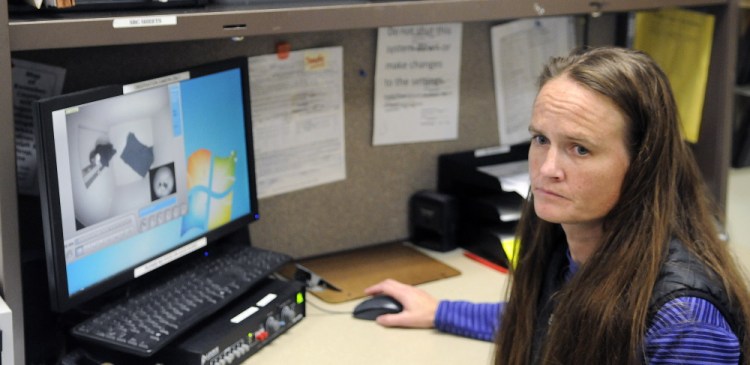An emergency bill its sponsors hope will be a key step in fixing a staffing crisis at the state-run Riverview Psychiatric Center in Augusta is awaiting Gov. Paul LePage’s signature after receiving eleventh-hour legislative approval late last week.
L.D. 1645 provides direct-care workers at the state-run Riverview Psychiatric Recovery Center and at Dorothea Dix Psychiatric Center in Bangor with a wage increase that Sen. Roger Katz, R-Augusta, hopes will boost morale for employees at the hospital and help retain qualified staff.
“There is a real urgent staffing crisis, and I hope this bill will help solve part of it,” Katz, who sponsored the bill, said Monday. “There are still huge challenges ahead.”
Mandated shifts and forced overtime lowered employee morale, drove away good workers and left those remaining exhausted and worried about themselves and their patients, a number of mental health workers, nurses and other Riverview staffers told legislators during a forum at the University of Maine at Augusta in January.
The emergency bill stipulates that acuity specialists, licensed practical nurse positions and mental health workers would receive $2 more per hour and certain nurse and psychologist positions would receive a $4 per hour increase. The changes would take effect in July.
Hourly pay for acuity specialists ranges from $14.88 to $19.88, while pay for a nurse III or charge nurse at the hospital, the predominant registered nurse job class at Riverview, ranges from about $26.15 to $32.40 hourly and includes recruiting and retention stipends.
Katz said because of the number of vacancies and number of workers out either sick or injured, many employees were mandated by their contract to work overtime.
“They appreciate the opportunity to work overtime occasionally,” Katz said, noting that extra money is not something to be taken for granted. “But when mandated overtime became a way of life, it was extremely demoralizing, and when someone is that exhausted, the quality of care is going to suffer too.”
Rep. Aaron Frey, D-Bangor, a cosponsor of the bill, said in a news release that Riverview’s staffing shortage could not be fixed if the jobs pay inadequate wages. Katz said someone could make more money working at Wal-Mart and not have to face the physical dangers Riverview workers sometimes encounter. The hospital has about 370 employees, including people who work on Riverview outpatient teams.
“This is an investment that will help recruitment and retention and ultimately improve conditions for both patients and staff,” Frey said.
Jenna Mehnert, executive director of the National Alliance on Mental Illness, Maine, said her group has been supportive of the legislation that addresses one of the top problems at Riverview, because “we don’t want Riverview to be a training ground only.”
“Staff there need to have competitive wages and be recognized for the work they’re doing,” Mehnert said. “There’s no way to build a solid functional hospital without appropriate training and staff. ”
Riverview is a 92-bed hospital split between civil and forensic units and houses patients who have proved to be dangerous and difficult to handle, some of whom have been found not responsible for crimes because of their mental health problem.
Katz said the state-run hospital cannot compete with MaineGeneral Medical Center in Augusta or VA Maine Healthcare System-Togus, so wages have to change if Riverview is going to retain its workers. An upcoming pay increase should also help fill staff vacancies more quickly.
“With the increase in pay and hopeful decrease in forced overtime, it should be easier to retain people,” Katz said. “Under-staffing continues to be a problem, but the administration has become much more aggressive seeking out workers.”
Laura Fisher, president of the union that represents mental health workers at Riverview, said in an op-ed for the Kennebec Journal last week that understaffing and staffing turnover are two of the biggest challenges. She said mental health workers logged more than 23,000 hours of overtime last year and more than 2,000 hours in January 2016.
“This excessive overtime is detrimental to the health and well-being of the staff and ultimately affects patient care,” Fisher wrote. “We need to attract qualified people, which is hard to do when the work is difficult and they know they will have an unpredictable schedule, forced overtime and pay that doesn’t compete.”
Fisher, who has been a mental health worker at Riverview for nearly 30 years, said staff turnover is high because some workers can’t keep up with the mandated overtime and because they can make more money elsewhere and have a reliable schedule.
Katz said this bill is only a part of the solution to the ongoing crisis at Riverview. The federal Centers for Medicare and Medicaid Services, which oversees Riverview funding, found numerous problems during an audit, including the use of stun guns, pepper spray and handcuffs on patients; improper record-keeping; medication errors and failure to report progress made by patients. As a result, the hospital lost eligibility for federal reimbursement of about $20 million annually.
Meanwhile, Riverview’s former superintendent, Jay Harper, cited health reasons when he reportedly submitted his resignation last month. A successor has not been publicly named. State lawmakers also recently blocked LePage’s controversial proposal to allow some dangerous or violent psychiatric patients to be held in a special Maine State Prison mental health unit.
The LePage administration, Katz said, needs to come up with an overall plan to deal with other issues at the hospital, including how to handle dangerous patients and where to send patients that no longer need hospital-level care.
“The overall solutions are complicated,” Katz said. “But this legislation is a good part of the solution.”
Mehnert said she hopes the effort also opens up a broader conversation about how the state can best address the problems at Riverview, which she said should include “looking at the real issues” in the findings by the Centers for Medicare and Medicaid Services.
“The two most important components are leadership and staff empowerment, and by that I mean appropriate compensation and training,” Mehnert said. “We’ve encouraged, from the beginning, to take the CMS findings and have an invested stakeholder group sit down at the table and piece-by-piece, with the superintendent of Riverview, come up with solutions together. So far, as far as us mental health advocates, there hasn’t been such a table.”
Jason Pafundi — 621-5663
Twitter: @jasonpafundiKJ
Send questions/comments to the editors.






Comments are no longer available on this story